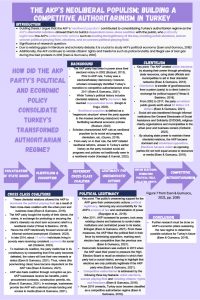Natasha Manroy
Winter 2024 Capstone Project Title: The AKP’s Neoliberal Populism: Building a Competitive Authoritarian Regime
Project Description: I investigated the means with which the AKP or AK party in Turkey facilitated the authoritarian turn and democratic collapse in Turkey, its transition from a tutelary or electoral democracy to a competitive authoritarian regime. The case of Turkey’s democratic decay remains highly puzzling to scholars as it is unlike common cases of democratic decay. My paper focused on answering the question: how did the AKP’s political and economic policy contribute to the consolidation of Turkey’s transformed authoritarian regime? My paper argued that the AKP’s neoliberal populism contributed to consolidating Turkey’s competitive authoritarian regime, as the AKP’s clientelist relations allowed them to build a dependent cross-class coalition with the public. This cross-class coalition politically legitimized the AKP’s undemocratic actions, eroding the legitimacy of the law, creating unfair elections, and developing an uneven political playing field. Neoliberal populism is generally described as maintaining populist policies of appealing to the public (working class, the poor) while maintaining the hegemony of a neoliberal model where the bourgeoise maintain their power and interests over the lower classes. Scholars classify the AKP’s clientelism as a key source of its neoliberal populism. The AKP created a cross-class coalition with the poor and working class (the majority of the public) but also wealthy elite business owners through clientelism. Clientelism, a political strategy, indicates how the party uses informal networks (religious charities, informal institutions, municipalities, etc.) to essentially ‘buy votes’ by providing the poor and working class with money, resources, jobs, housing, etc. in exchange for voters’ political support. Indeed, the party consists of over 10 million members across Turkey. Likewise, business owners remain loyal to the party as the ruling party is able to provide them access to lucrative contracts, profitable deals and tax benefits, etc. in exchange for the AKP obtaining business donations and media access. This cross-class coalition creates ‘dependency traps’ for the poor as they are only given social aid and welfare if they vote for the AK party. This causes them to become dependent on AKP rule, especially due to AKP neoliberal reforms aiming to consolidate a neoliberal model in Turkey, which privileges corporate interests over the worker. This dependency becomes dangerous as it creates unwavering public support for the AKP, maintaining political legitimacy for the party’s increasingly authoritarian actions like restricting citizens’ rights and freedoms in order for the AKP to dominate the political playing field and punish opposing support. Hence, due to the AKP’s neoliberal populism, the AKP successfully created unfair elections (due to abusing state power and resources to maintain their clientelism), developed an uneven political playing field (due to their dominance and broad voter support), and restricted rights and freedoms (to punish opposing support)–all three are characteristics of a competitive authoritarian regime.
The 1C06 Capstone experience: I found the western ideals of promoting democracy with neoliberal economy interesting considering maintaining a true neoliberal economy is difficult within a democracy, which calls for public interests rather than private interests. Hence, I started to look at cases of democratic decay in places like Poland, Hungary, and Turkey. Turkey especially captivated my attention considering the ruling party held power before and after the democratic collapse. This led me to consider why and how the was party able to lead the authoritarian regime change without large public dissent. The more that I worked on it, the more interested I became, especially when I encountered neoliberal populism. That concept particularly captured my attention alongside the AKP’s neoliberal populism, and how they were able to enact it on such a large scale and basis, employing religious values to sustain their hegemony over the masses/public. The more reports I read, the more I saw how most of Turkey predominately supports Erdogan (AKP leader) despite the authoritarian regime he helped build and create, and despite all the rights violations.
Key Takeaways: I learned many things including the ability of the AKP to create such a broad cross-class coalition, unseen before in Turkish political history, despite other parties’ utilizing clientelism in the past. Further, I learned the notion that their competitive authoritarian regime was created predominately by the AKP employing a cross-class coalition through clientelist and redistributive policies, to essentially use that public support to get away with whatever antidemocratic actions they wanted. It was definitely an interesting study and interesting to compare it to other cases of populism like in the U.S or other parts of the world. However, Turkey’s case remains almost exceptional considering they consisted of a weak democracy prior to the regime change hence their base was not so strong unlike other countries like the U.S, with a long history of democracy.
Click here to read interviews with the other first year Arts & Science students.


